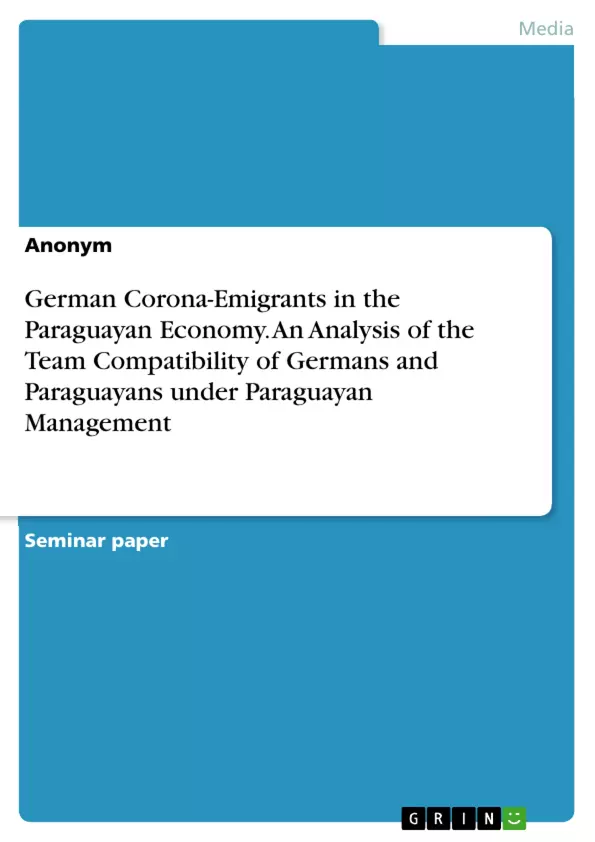This paper will shed light on the challenges, hurdles and opportunities of German workers in Paraguayan teams in relation to the Corona pandemic. In 2021 alone, according to the statistics of the German immigration authorities, about eleven hundred Germans decided to officially emigrate to Paraguay. Thus, Paraguay is suddenly among the most popular German destinations for emigration.
Since mid-March 2020, the Corona pandemic has kept the entire world on tenterhooks, and governments worldwide have been faced with the unique and special challenge of preserving human and civil rights while halting a highly contagious, ever-evolving virus. The balancing act between easing the burden on health systems and securing popular support was very difficult for many governments. Citizen frustration and discontent, coupled with fake news, radical right-wing groups and conspiracy theory associations, caused riots, violence and, most importantly, a loss of voter confidence in politics in many countries and cities.
Following the introduction, the reader is guided through three main chapters. Chapter two begins by drawing on the scientific foundations for this work. First, the cultural dimensions according to the GLOBE study are presented. For all nine dimensions, a brief comparison between Germans and Paraguayans is already presented. Then, Tuckman's model of team development and maintenance will be used. In the third chapter of the thesis, the Latin American leadership style that German employees can expect in the field is presented based on the GLOBE study.
The author then takes the reader through the formation and leadership of a Paraguayan-German team under Paraguayan leadership using Tuckman's different phases and addresses the potentially problematic interactions of the two nationalities in each phase using the cultural dimensions explained in chapter two. Particular attention is paid to the mostly conservative to radical right-wing political attitudes of the German emigrants. Chapter five concludes on the opportunities and hurdles faced by German emigrants in Paraguay, including a brief appreciation of the skilled labor situation in Paraguay, and provides an outlook on the future development of emigrants.
Inhaltsverzeichnis (Table of Contents)
- Introduction
- Relevance of the topic
- Structure of the paper
- Background Information
- The culture dimensions of the GLOBE Study
- Performance Orientation
- Assertiveness
- Future Orientation
- Humane Orientation
- Institutional Collectivism
- In-Group Collectivism
- Gender Egalitarism
- Power Distance
- Uncertainty Avoidance
- Bruce Tuckman's stage model for team development
- Forming
- Storming
- Norming
- Performing
- Adjourning
- Developing and maintaining a German-Paraguayan Team as a Paraguayan Leader
- The Latin American Leadership Style based on the GLOBE Study
- Stages of developing a German-Paraguayan Team under Paraguayan Leadership
- Forming
- Storming
- Norming
- Performing
- Adjourning
- Conclusion
Zielsetzung und Themenschwerpunkte (Objectives and Key Themes)
This paper analyzes the compatibility of German and Paraguayan teams under Paraguayan leadership, focusing on the recent influx of German immigrants to Paraguay. The study utilizes the GLOBE study, Hofstede's cultural dimensions, and Tuckman's team building model to understand the cultural differences and potential challenges in team formation and development.
- The impact of the COVID-19 pandemic on migration patterns, specifically German emigration to Paraguay
- The cultural differences between Germany and Paraguay, as highlighted by the GLOBE study and Hofstede's dimensions
- The application of Tuckman's team building model to understand the stages of team development in a German-Paraguayan context
- The challenges and opportunities presented by managing a German-Paraguayan team under Paraguayan leadership
- The implications of this analysis for fostering effective intercultural collaboration in a business context
Zusammenfassung der Kapitel (Chapter Summaries)
The introduction provides a detailed overview of the recent increase in German emigration to Paraguay, linking this phenomenon to the global COVID-19 pandemic and the differing responses to it in Germany and Paraguay. This chapter highlights the motivations behind the emigration and discusses the potential challenges and opportunities presented by this cultural exchange.
Chapter 2 delves into the theoretical background of the study, outlining the cultural dimensions identified by the GLOBE Study and Hofstede's model. It explores the specific cultural differences between Germany and Paraguay, providing a foundation for understanding the potential for team challenges and opportunities.
Chapter 3 applies the theoretical framework to the specific context of a German-Paraguayan team managed by a Paraguayan leader. This chapter examines the stages of team development based on Tuckman's model, analyzing the challenges and opportunities at each stage in light of the cultural differences discussed previously. The chapter emphasizes the importance of understanding the unique leadership styles and communication dynamics of each culture to build effective team collaboration.
Schlüsselwörter (Keywords)
This paper focuses on the topics of intercultural competence, German emigration, Paraguayan economy, team compatibility, GLOBE study, Hofstede's cultural dimensions, Tuckman's team building model, and Latin American leadership style.
- Quote paper
- Anonym (Author), 2022, German Corona-Emigrants in the Paraguayan Economy. An Analysis of the Team Compatibility of Germans and Paraguayans under Paraguayan Management, Munich, GRIN Verlag, https://www.grin.com/document/1449627



